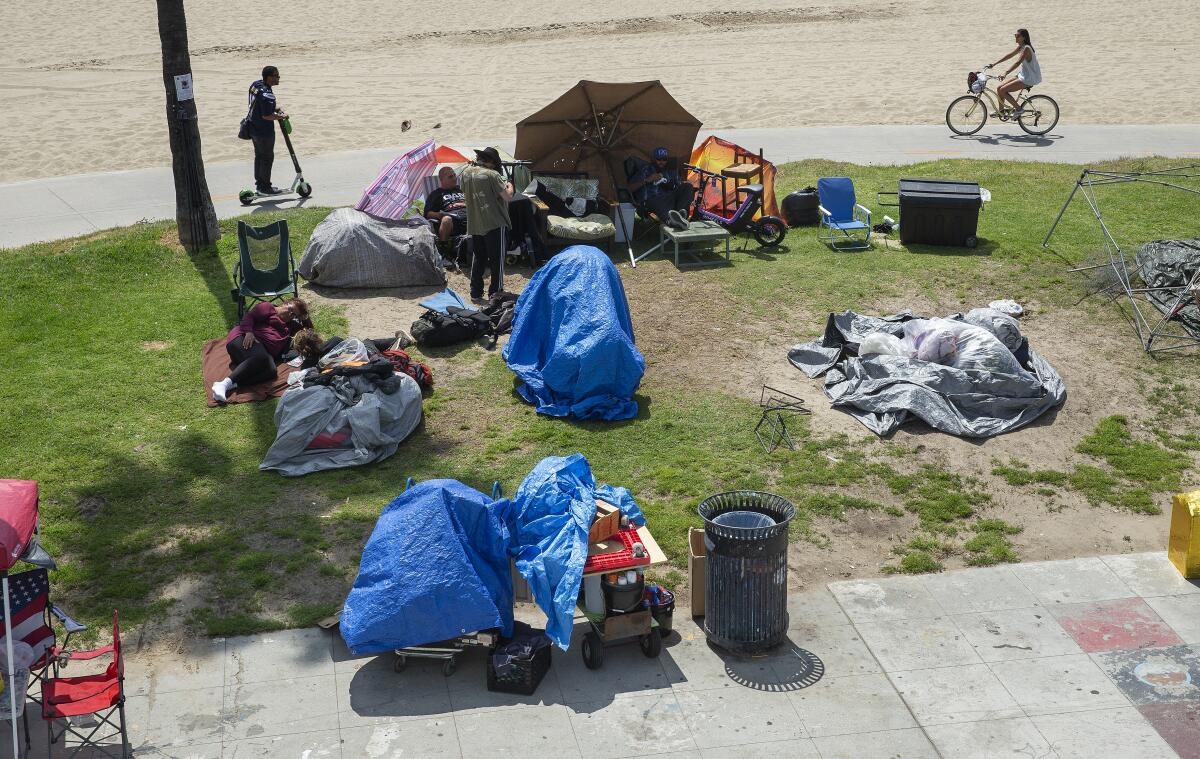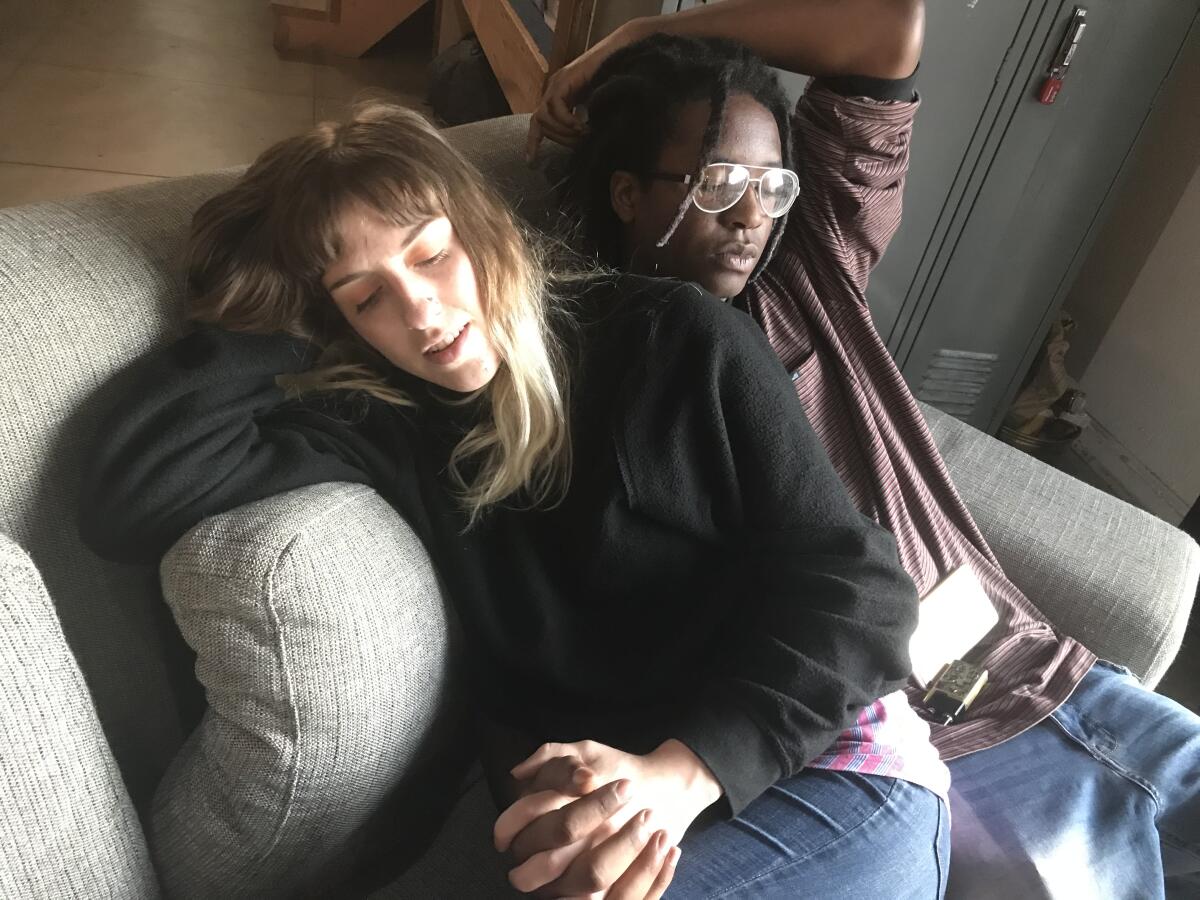Column: L.A.’s homeless numbers can numb us. Stories help us see people, not stats

- Share via
I see the world in stories, in the intimate details of people’s lives. Lives are lived on a scale I can fathom and feel. I connect with them in a way I often don’t with large numbers, which sometimes simply flatten, freeze and numb me.
I don’t think I’m alone in that reaction to the horrifying hugeness of our homeless crisis.
In the city of Los Angeles, at latest count, we have more than 36,000 homeless people. Include the county and we’re hovering close to 60,000.
Last week, in an effort to illuminate what it might feel like to be among them, I told you the close-up experience of two young people who were part of that overwhelmingly large crowd for months.
Like many who came before them and many who will follow, they arrived here with little besides starry eyes. They had their bags, $800 and what turned out to be a flimsy promise that when they got here they’d be welcomed and housed.
In retrospect, of course, they understand that their trip here was perilous. Two weeks later, they were homeless.
Some readers have taken me to task for taking the time to tell the story of people they say are unworthy of our notice on the grounds that they were foolhardy and irresponsible and failed to plan and never should have come to L.A. in the first place.
But it really wasn’t why Loxk Calhoun, 20, and Bri Meilbeck, 24, came here — or to open a referendum on the wisdom of that choice — that led me to share their story with you.
It was their story itself — of a rapid descent into homelessness, of how they felt and what they did as it happened, of what came next as they found themselves sinking deeper.
These weren’t hardened addicts. These weren’t people in mental distress. To me, they just felt invulnerable as the youthful often do and weren’t really looking where they were going and so fell into a deep hole. I made a lot of mistakes at their ages that really weren’t so different. And when I hear these kinds of stories I often think, am I really so immune even now to crises that could turn my own life similarly upside down?

I knew I had to tell the story as soon as Bri described to me how scared she was that first night without a roof over her head or even a tent to shield her from view, lying in a park in a city in which she knew no one and had no idea what to do next.
When I tried to put myself in her place, I felt an actual shiver run through me. Here was a young person with a lot less experience than I have traveling and encountering the new — and yet it struck me that she was in many ways braver and more capable than I might have been in the same situation.
When I look at the people living on our streets, by the way, I know I don’t have the power to sort out how they got here. I can’t just look at them and glean their origin stories. It also makes no real sense to me to try to decide who has a legitimate reason to wind up here.
How do I know without a lot of reporting, for instance, whether homelessness or mental illness and addiction came first? How do I know who lived here and lost housing and who didn’t and for some reason may not want it?
As a rule, I don’t deal much in could haves and should haves and judgments of these people I don’t know. The fact is they are here — and so many of them need help and compassion.
Sometimes I think this person needs drug treatment, or that person really doesn’t have the ability to take care of himself, or this other person screaming and lunging at others could be a danger to herself and to me. Often I think about solutions and how far we seem to be from them.
Often I also lock eyes with a stranger for a second and think this person looks tired, this person looks worn. I wonder what his or her life is like. Is he alone? Does she have a home?
I also find myself thinking about my own luck, about how I have things that others do not, both tangible (the house I live in, a job, money) and less tangible (people who love me, stability, a support system). And I wonder how I would manage if suddenly I lost my rich array of amulets.
I’ve always been fascinated by the people who arrive here each day with nothing but oversize Hollywood dreams. I’ve met and written about a lot of them over the years. They are a cliche for a reason — and that reason is that they are common.
Bri and Loxk, the particular dreamers I wrote about last week, now are getting some extra assistance, thanks to the generosity of readers. If it helps them succeed, I will be happy.
But I didn’t write about them to get one couple help.
My hope is that in my columns I can introduce you to people you might otherwise not meet, that I can make you feel their experience and maybe even some shared humanity.
So many forces are at work here. So many people play a part. But I know I’m not alone in the belief that we need to make noise and lobby and work together to chip away at this giant problem we all face.
Compassion and empathy and education about how people end up living on our streets may help us say yes to housing homeless people in our neighborhoods. It may make us feel compelled to lobby those in power for the treatment and resources that a lot of people need but cannot readily get.
If we think of people on the street not as others but as people not so different underneath it all from people we know, it also might make us come up with new strategies to direct people in need to help that already exists.
It was with that simple intention in mind that I told you the story of two people who made some mistakes and then found themselves in deep trouble and then got a little help to right their course.
More to Read
Sign up for Essential California
The most important California stories and recommendations in your inbox every morning.
You may occasionally receive promotional content from the Los Angeles Times.











